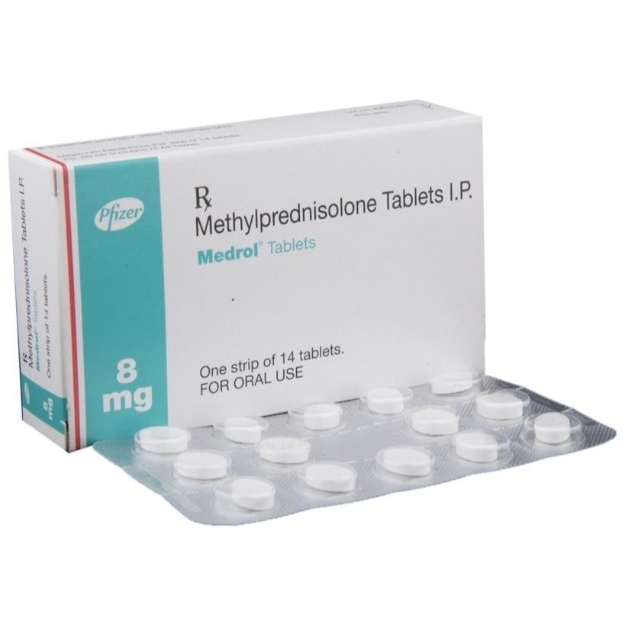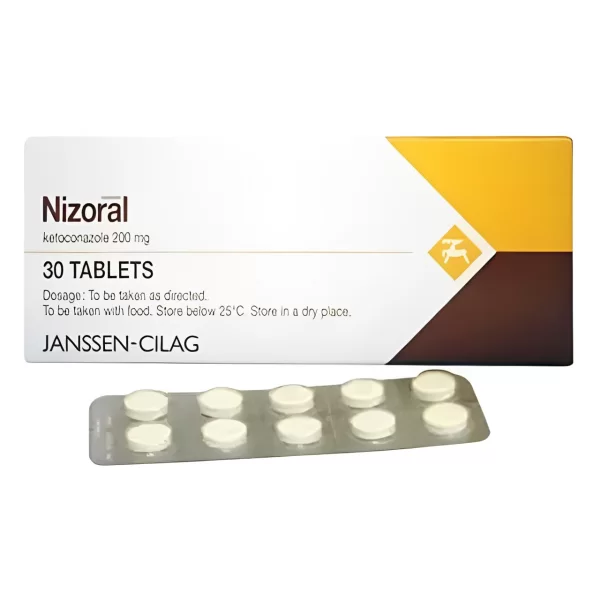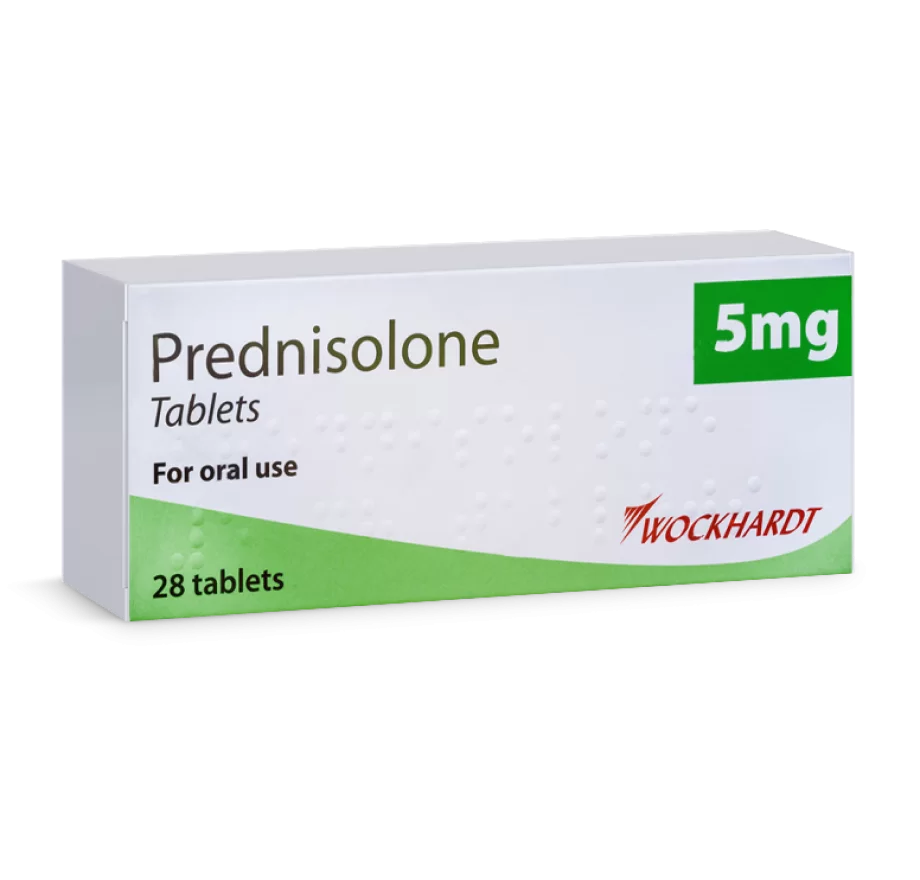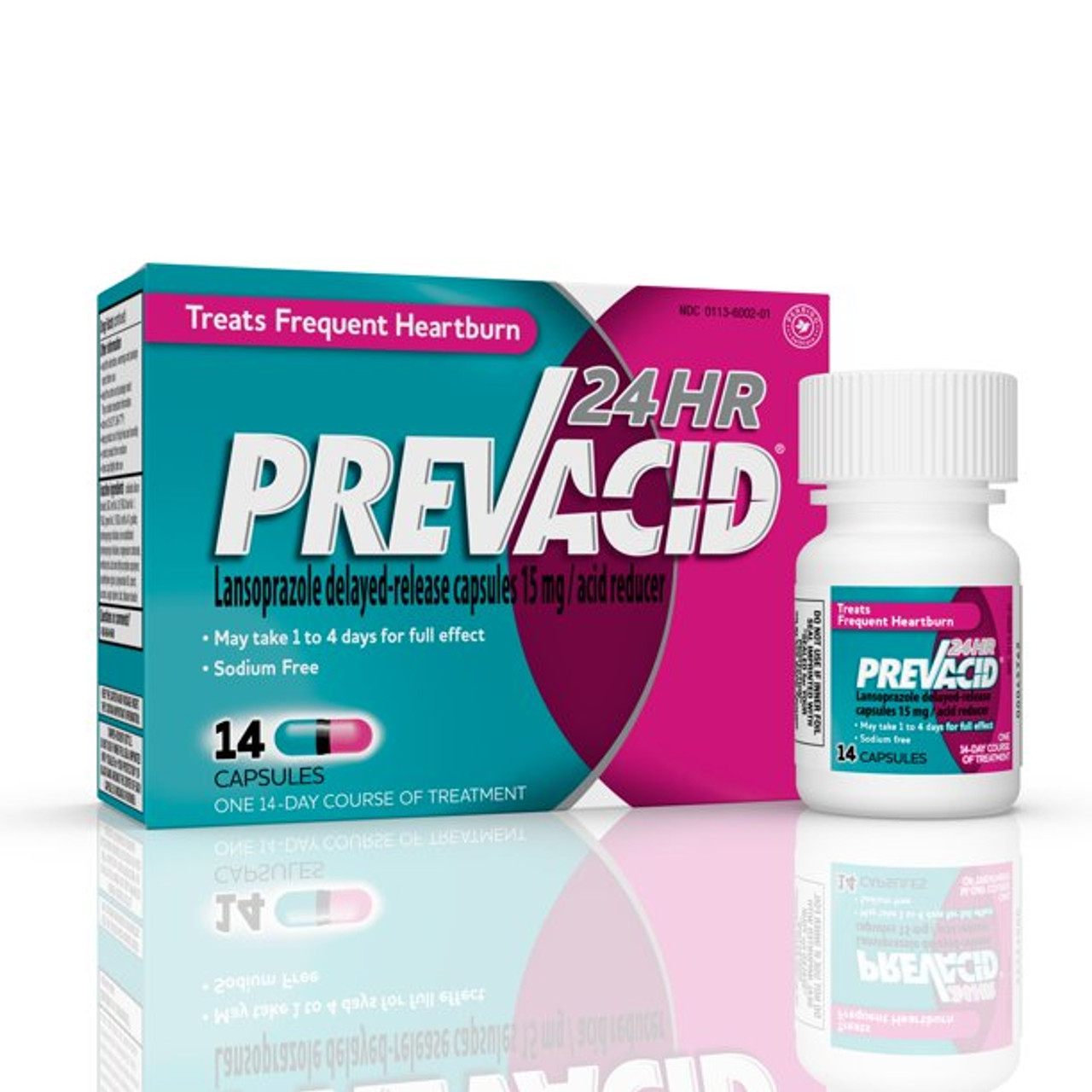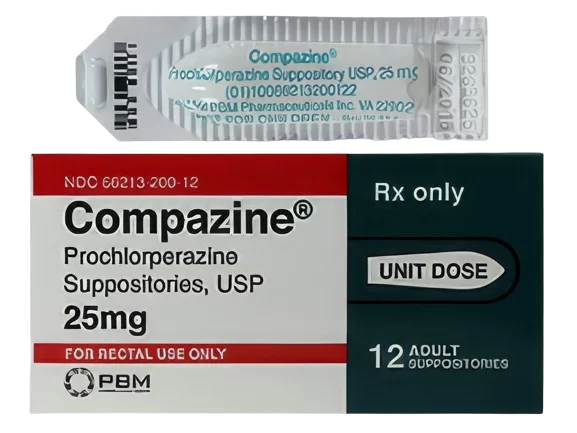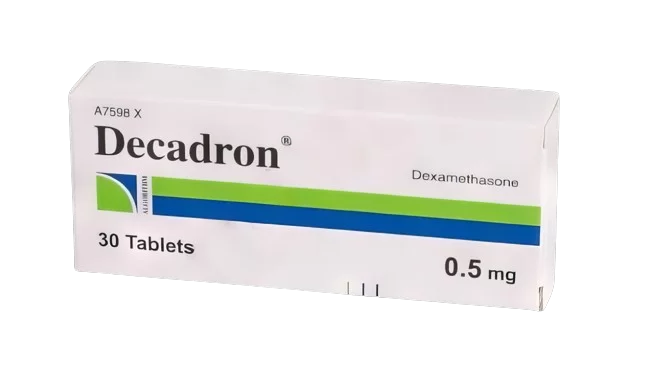
Decadron
Decadron - 8mg
| Product | Per Pill | Savings | Per Pack | Order |
|---|---|---|---|---|
| 10 pills | $4.01 | $40.10 | Buy Now | |
| 20 pills | $3.16 | $17.07 | $80.20 $63.13 | Buy Now |
| 30 pills | $2.87 | $34.15 | $120.30 $86.15 | Buy Now |
| 60 pills | $2.59 | $85.37 | $240.60 $155.23 | Buy Now |
| 90 pills | $2.49 | $136.59 | $360.90 $224.31 | Buy Now |
| 120 pills | $2.44 | $187.81 | $481.20 $293.39 | Buy Now |
| 180 pills | $2.40 | $290.25 | $721.80 $431.55 | Buy Now |
| 270 pills | $2.37 | $443.91 | $1082.70 $638.79 | Buy Now |
Decadron - 4mg
| Product | Per Pill | Savings | Per Pack | Order |
|---|---|---|---|---|
| 20 pills | $2.71 | $54.20 | Buy Now | |
| 30 pills | $2.30 | $12.29 | $81.30 $69.01 | Buy Now |
| 60 pills | $1.89 | $49.17 | $162.60 $113.43 | Buy Now |
| 90 pills | $1.75 | $86.05 | $243.90 $157.85 | Buy Now |
| 120 pills | $1.69 | $122.93 | $325.20 $202.27 | Buy Now |
| 180 pills | $1.62 | $196.68 | $487.80 $291.12 | Buy Now |
| 270 pills | $1.57 | $307.31 | $731.70 $424.39 | Buy Now |
Decadron - 1mg
| Product | Per Pill | Savings | Per Pack | Order |
|---|---|---|---|---|
| 60 pills | $0.85 | $50.91 | Buy Now | |
| 90 pills | $0.71 | $12.22 | $76.37 $64.15 | Buy Now |
| 120 pills | $0.64 | $24.44 | $101.83 $77.39 | Buy Now |
| 180 pills | $0.58 | $48.88 | $152.74 $103.86 | Buy Now |
| 270 pills | $0.53 | $85.53 | $229.10 $143.57 | Buy Now |
| 360 pills | $0.51 | $122.19 | $305.47 $183.28 | Buy Now |
Decadron - 5mg
Overview of Decadron
General Introduction
Decadron, also known by its generic name dexamethasone, is a corticosteroid medication used to treat a variety of inflammatory and autoimmune conditions. It works by suppressing the immune system and reducing inflammation, thereby alleviating symptoms such as swelling, pain, and allergic reactions. Decadron is commonly prescribed for conditions such as arthritis, severe allergies, asthma, and certain types of cancer. It is available in multiple forms, including tablets, injections, and topical applications, providing flexibility in administration based on the patient's needs.
History of Development and Approval
Dexamethasone was first synthesized in 1957 by Dr. Philip Showalter Hench, who won the Nobel Prize for his work on corticosteroids. Decadron received approval from the U.S. Food and Drug Administration (FDA) in the early 1960s. Since then, it has become a widely used and trusted medication in managing a variety of conditions due to its potent anti-inflammatory and immunosuppressive properties.
Key Benefits
Decadron offers several key benefits for patients with inflammatory and autoimmune conditions:
- Anti-inflammatory Effects: Effectively reduces inflammation and related symptoms.
- Immunosuppressive Action: Helps manage autoimmune conditions by suppressing immune system activity.
- Versatile Use: Treats a wide range of conditions from allergies to cancer.
- Multiple Formulations: Available in tablets, injections, and topical forms for flexible administration.
Unique Properties
Decadron is unique due to its high potency and long duration of action compared to other corticosteroids. This makes it particularly effective in managing severe inflammatory conditions and reducing the frequency of dosing. Its ability to cross the blood-brain barrier also makes it useful in treating neurological conditions such as brain edema associated with tumors or surgery.
Comparison with Similar Medications
Compared to other corticosteroids, Decadron offers distinct advantages:
- Higher Potency: More effective at lower doses compared to other corticosteroids.
- Longer Duration of Action: Provides prolonged relief from symptoms, reducing the need for frequent dosing.
- Crosses Blood-Brain Barrier: Useful in treating central nervous system conditions.
Safety and Tolerability
Decadron is generally well-tolerated when used as directed. Common side effects include insomnia, mood changes, and increased appetite. Serious side effects are rare but may include adrenal suppression, osteoporosis, and increased risk of infections. Regular monitoring by a healthcare provider is recommended, especially during long-term use, to ensure patient safety and optimal therapeutic outcomes.
Indications for Use
Diseases and Conditions Treated
Decadron is prescribed for:
- Inflammatory Conditions: Such as rheumatoid arthritis, lupus, and inflammatory bowel disease.
- Allergic Reactions: Including severe allergic rhinitis and asthma exacerbations.
- Autoimmune Diseases: Such as multiple sclerosis and certain types of vasculitis.
- Cancer: To reduce inflammation and manage symptoms associated with chemotherapy.
- Neurological Conditions: Such as brain edema and spinal cord injuries.
Symptoms Indicating Use
Patients experiencing severe inflammation, allergic reactions, or symptoms of autoimmune diseases may benefit from Decadron. It is particularly effective for conditions where rapid suppression of inflammation is required.
Dosage and Administration
Recommended Dosage for Adults
The dosage of Decadron for adults varies widely depending on the condition being treated. Typical doses range from 0.5 mg to 10 mg per day, taken in divided doses. In severe cases, higher doses may be required initially, followed by a gradual tapering based on the patient's response and clinical condition.
Dosage for Children
Dosing for children is based on body weight and the specific condition being treated. The typical starting dose is 0.08 to 0.3 mg/kg per day, divided into several doses. Pediatric dosing should always be determined by a healthcare provider to ensure safety and efficacy.
Dosage for Elderly Patients
Elderly patients may require dose adjustments based on their overall health and the presence of co-existing conditions. Lower doses are often recommended to minimize the risk of side effects such as osteoporosis and adrenal suppression.
Optimal Timing of Administration
Decadron can be taken with or without food. It is usually recommended to take it in the morning to mimic the body's natural rhythm of cortisol production and reduce the risk of insomnia. For multiple daily doses, taking the last dose by early afternoon can help avoid sleep disturbances.
Frequency of Administration
The frequency of administration depends on the specific condition and severity of symptoms. It can range from a single daily dose to multiple doses throughout the day. Adhering to the prescribed frequency ensures the medication's effectiveness and minimizes the risk of side effects.
Impact of Food on Efficacy
Food does not significantly impact the efficacy of Decadron. However, taking it with food can help reduce gastrointestinal side effects such as stomach upset.
Pharmacological Action
Mechanism of Action
Dexamethasone, the active ingredient in Decadron, works by binding to glucocorticoid receptors in the body, leading to suppression of inflammatory and immune responses. It inhibits the production of inflammatory mediators such as cytokines and prostaglandins, thereby reducing inflammation and immune activity.
Molecular and Cellular Targets
Dexamethasone targets glucocorticoid receptors present in various tissues throughout the body. By activating these receptors, it modulates the expression of specific genes involved in inflammation and immune response, leading to a decrease in the production of inflammatory cytokines and other mediators.
Metabolic Pathways
Dexamethasone is metabolized primarily in the liver by cytochrome P450 enzymes, particularly CYP3A4. It is converted into inactive metabolites, which are then excreted via the urine. The half-life of dexamethasone is approximately 36 to 54 hours, allowing for prolonged effects.
Biochemical Changes
By suppressing the production of inflammatory mediators, Decadron reduces inflammation and immune activity. This biochemical change leads to decreased swelling, pain, and other symptoms associated with inflammatory and autoimmune conditions.
Physiological Effects
The physiological effects of Decadron include reduced inflammation, decreased immune system activity, and relief from symptoms such as pain, swelling, and allergic reactions. These effects help improve overall function and quality of life for patients with various inflammatory and autoimmune conditions.
Composition
Active Ingredient
The active ingredient in Decadron is dexamethasone. It is available in tablet form, typically in strengths ranging from 0.5 mg to 6 mg, as well as in injectable and topical forms.
Inactive Ingredients
Inactive ingredients in Decadron tablets may include lactose, magnesium stearate, microcrystalline cellulose, and pregelatinized starch. These ingredients help in the formulation and stability of the medication, ensuring that it is effective and safe for patient use.
Role of Each Component
Dexamethasone acts as the primary therapeutic agent, while inactive ingredients ensure proper formulation, stability, and absorption of the medication. The inactive ingredients also contribute to the tablet's integrity and ease of administration.
Side Effects
Common Side Effects
Common side effects of Decadron include:
- Insomnia: Difficulty sleeping, especially when taken late in the day.
- Mood Changes: Including anxiety, depression, and mood swings.
- Increased Appetite: Leading to potential weight gain.
- Stomach Upset: Including nausea and indigestion.
Rare Side Effects
Rare side effects may include:
- Adrenal Suppression: Reduced production of natural steroids by the adrenal glands.
- Osteoporosis: Weakening of bones, increasing the risk of fractures.
- Infections: Increased susceptibility to infections due to immune suppression.
- Hyperglycemia: Elevated blood sugar levels, especially in diabetic patients.
Serious Side Effects
Serious side effects requiring immediate medical attention include:
- Severe Allergic Reactions: Symptoms such as rash, itching, swelling, and difficulty breathing.
- Severe Infections: Such as sepsis, requiring prompt medical intervention.
- Psychiatric Effects: Severe mood swings, hallucinations, or suicidal thoughts.
- Severe Hypertension: Significantly elevated blood pressure.
Frequency and Severity
Most side effects are dose-dependent and occur primarily during the initial phase of treatment or with high doses. Serious side effects are rare but warrant close monitoring by a healthcare provider. Regular follow-up appointments can help manage and mitigate these risks.
Prevention of Side Effects
General Precautions
To minimize side effects, patients should follow the prescribed dosage and avoid taking more than the recommended dose. It is important to inform the healthcare provider of any existing medical conditions and medications being taken, particularly those that may interact with Decadron.
Recommendations for Better Tolerability
Using Decadron as directed and maintaining regular follow-up appointments with a healthcare provider can improve tolerability. Patients should be educated on the importance of adhering to the prescribed treatment regimen and monitoring their response to the medication. Staying hydrated and maintaining a balanced diet can also help reduce gastrointestinal side effects.
Contraindications
Conditions and Diseases
Decadron is contraindicated in patients with:
- Known Hypersensitivity: To dexamethasone or any of its components.
- Systemic Fungal Infections: Due to the risk of exacerbating the infection.
- Untreated Infections: Active or untreated infections that may worsen with immunosuppression.
Explanation of Contraindications
Dexamethasone may exacerbate certain conditions, such as systemic fungal infections, due to its immunosuppressive effects. Hypersensitivity reactions can cause severe allergic responses, making it crucial to assess a patient's medical history before prescribing Decadron.
Warnings and Precautions
Potential Risks
Patients should be monitored for signs of adrenal suppression, osteoporosis, and increased risk of infections, particularly during long-term use. Regular blood tests may be required to monitor blood sugar levels, liver function, and electrolyte balance, especially in patients with pre-existing conditions.
Safety Measures
Regular monitoring by a healthcare provider, starting with a low dose, and adjusting as needed can help mitigate risks. Patients should be instructed to report any symptoms of severe infections, mood changes, or signs of adrenal suppression immediately.
Missed Dose
Immediate Actions
If a dose is missed, take it as soon as remembered unless it is almost time for the next dose. Do not double the dose to catch up. Continue with the regular dosing schedule to maintain consistent blood levels of the medication.
Preventive Strategies
Using reminders and keeping a consistent schedule can help prevent missed doses. Patients can set alarms, use medication reminder apps, or keep a medication diary to track their doses, ensuring adherence to the treatment regimen.
Drug Interactions
Interacting Medications
Decadron may interact with various medications, including:
- NSAIDs: Such as ibuprofen, which can increase the risk of gastrointestinal bleeding.
- Diuretics: Such as furosemide, which can lead to electrolyte imbalances.
- Anticoagulants: Such as warfarin, which can increase the risk of bleeding.
- Vaccines: Live vaccines should be avoided due to the risk of infection.
Effects of Interactions
These interactions can affect the metabolism and efficacy of Decadron or the concomitant medications. For instance, combining Decadron with NSAIDs may increase the risk of gastrointestinal side effects. Monitoring for side effects and adjusting dosages may be necessary to manage these interactions.
Avoiding Interactions
Inform the healthcare provider of all medications being taken to avoid potential interactions. Patients should not start, stop, or change the dosage of any medicines without their healthcare provider’s approval. Regular reviews of medication regimens can help identify and manage potential interactions.
Overdose
Symptoms of Overdose
Symptoms of overdose may include severe dizziness, fainting, and irregular heartbeat. Seek emergency medical help if an overdose is suspected.
Immediate Actions
Seek emergency medical help if an overdose is suspected. Supportive measures and symptomatic treatment are recommended. Activated charcoal may be administered if the overdose is recent, and intravenous fluids may be given to maintain hydration and support cardiovascular function.
Pharmacokinetics
Absorption
Dexamethasone is well-absorbed from the gastrointestinal tract, with peak plasma concentrations reached within 1 to 2 hours after oral administration. The bioavailability of dexamethasone is approximately 80-90%.
Distribution
Dexamethasone is widely distributed throughout the body and is extensively bound to plasma proteins, primarily albumin. It crosses the blood-brain barrier and is also distributed to tissues such as the liver and kidneys.
Metabolism
Dexamethasone is metabolized in the liver by cytochrome P450 enzymes, particularly CYP3A4. It is converted into inactive metabolites, which are then excreted via the urine.
Elimination
The half-life of dexamethasone is approximately 36 to 54 hours, allowing for prolonged effects. It is excreted primarily in the urine as inactive metabolites.
Dosage Forms
Available Forms and Dosages
Decadron is available in tablet form, typically in strengths ranging from 0.5 mg to 6 mg, as well as in injectable and topical forms. These various forms and dosages allow for flexible and tailored treatment approaches based on patient needs and tolerability.
Benefits of Different Forms
The availability of multiple strengths and formulations of Decadron makes it suitable for various patient preferences and clinical situations. Different formulations allow for precise dosing adjustments based on therapeutic response and individual patient needs.
Pregnancy and Breastfeeding
Safety During Pregnancy
Decadron should be used during pregnancy only if the potential benefit justifies the potential risk to the fetus. There is limited data on the use of Decadron in pregnant women, and animal studies have shown adverse effects on the fetus. Pregnant women should discuss the potential risks and benefits with their healthcare provider before starting treatment.
Safety During Breastfeeding
It is not known whether dexamethasone is excreted in human milk. Due to the potential for adverse reactions in nursing infants, a decision should be made whether to discontinue breastfeeding or discontinue the drug, considering the importance of the drug to the mother. Breastfeeding mothers should consult their healthcare provider to weigh the potential risks and benefits.
Storage Conditions
General Recommendations
Store Decadron at room temperature between 20°C to 25°C (68°F to 77°F). Keep the medication in its original container, tightly closed, and out of reach of children and pets.
Specific Storage Instructions
Decadron tablets should be stored in a cool, dry place away from direct sunlight and moisture. Store according to the manufacturer's instructions to protect the medication from light and moisture.
Expiry and Stability
Check the expiration date on the package and do not use Decadron past the expiration date. Proper storage ensures the medication remains effective and safe to use. Dispose of expired or unused medication according to local regulations to prevent accidental exposure or misuse.
Clinical Trials and Efficacy
Overview of Clinical Studies
Decadron has undergone extensive clinical trials to evaluate its safety and efficacy in treating a variety of inflammatory and autoimmune conditions. These studies included randomized, double-blind, placebo-controlled trials involving thousands of patients worldwide.
Results and Findings
Clinical trials have shown that Decadron significantly reduces inflammation and symptoms associated with various conditions. Patients treated with Decadron demonstrated better outcomes compared to those receiving a placebo, with improvements in pain, swelling, and overall function.
Comparative Studies
Studies comparing Decadron with other corticosteroids have shown that Decadron provides effective symptom relief with a favorable safety profile. Its high potency and long duration of action make it a preferred choice for many healthcare providers.
Conclusion
Summary of Key Points
Decadron is an effective corticosteroid for the treatment of inflammatory and autoimmune conditions. Its ability to suppress inflammation and immune system activity provides significant therapeutic benefits for patients with these conditions. The medication is generally well-tolerated, with a well-documented safety profile.
Recommendations
For optimal results, patients should follow their healthcare provider's instructions regarding dosage and administration. Regular monitoring and follow-up appointments are essential to ensure the medication's effectiveness and manage any side effects. Patients should maintain a healthy lifestyle, including proper diet and exercise, to support overall health while on Decadron therapy.
Final Thoughts
Decadron significantly improves the quality of life for patients suffering from inflammatory and autoimmune conditions by effectively managing symptoms and reducing the risk of complications. With its proven efficacy and safety, Decadron remains a trusted choice for healthcare providers and patients in the management of these conditions.
